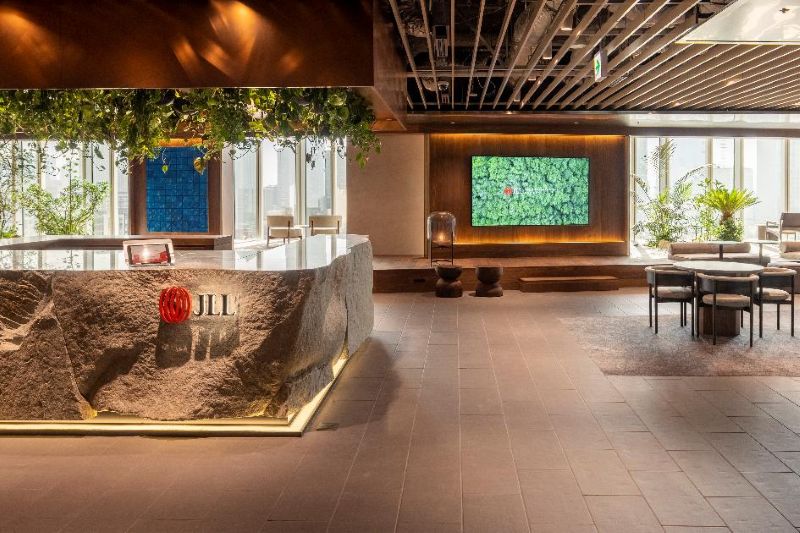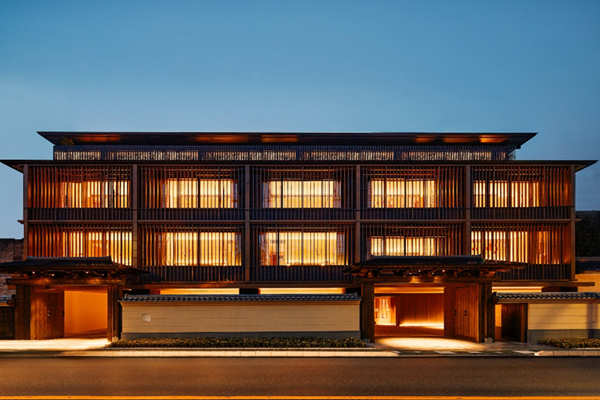
Project Overview
Project Name: Six Senses Kyoto
City: Kyoto
Building Use: Hotel, 81 guest rooms, total floor area 11,169.61㎡
Certification System: LEED v4 BD+C: Hospitality
Date of Certification: July 7, 2024
Certification Level: Silver
【Interviewees】
Mr. Motoki Kosaka – Executive Officer, Head of Design & Engineering, Development Division, Richesse Management, Inc.
Mr. Yasuhiro Yamazaki – Design & Engineering, Development Division, Richesse Management, Inc.
Mr. Kohei Niimi – Sales & Marketing, Six Senses Kyoto
【Interviewer】
Mr. Atsushi Miyazaki – GBJ Content Working Group
@ Six Senses Kyoto
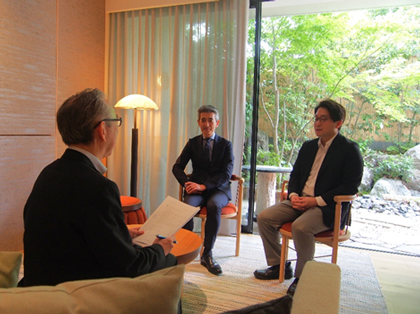
Mr. Miyazaki: Could you share the concept behind Six Senses Kyoto?
Mr. Yamazaki: Six Senses is a hotel brand founded in 1995, with the concept of sustainability, wellness, and out-of-the-ordinary experiences. As of August 2025, there are 26 Six Senses properties across 21 countries and regions. Six Senses Kyoto , which opened in April 2024, marks the brand’s first hotel in Japan. This property is a redevelopment of a hotel facility. Our goal was to create a distinctive, one-of-a-kind property, which led us to choose the Six Senses brand.
Mr. Niimi: Six Senses Kyoto is designed and operated in line with the Six Senses philosophy, which emphasizes sustainability and wellness. Situated in the tranquil Higashiyama district, close to RengeO-in temple (Sanjusangendo) and adjacent to Toyokuni Shrine, the hotel integrates Kyoto’s long-standing traditions and culture with modern technology.
Mr. Miyazaki: At Six Senses Kyoto, what kind of specific services do you offer to promote sustainability and wellness?
Mr. Niimi: To embody the wellness concept, we’ve designed the interiors—including the lobby—with natural materials and opened them up to a lush courtyard. Here, guests can truly experience the unique spirit of Six Senses Kyoto. For in-room amenities, we prioritize sustainability in mind. Guests are provided with bamboo toothbrushes and tube-free toothpaste. Even the drinking water is bottled in glass right here on-site at an underground lab, instead of plastic bottles. This helps reduce CO2 emissions by reusing containers and eliminating the need for transportation. We’ve also created a hotel-exclusive pesticide-free garden between the hotel and Toyokuni Shrine, where dedicated staff grow vegetables and herbs for use in the restaurant and spa. Kitchen waste is composted and reused in this garden. Guests can also enjoy hands-on learning experiences in this space. In addition, we offer a variety of experiential programs centered around sustainability and wellness to further immerse our guests in these important themes.
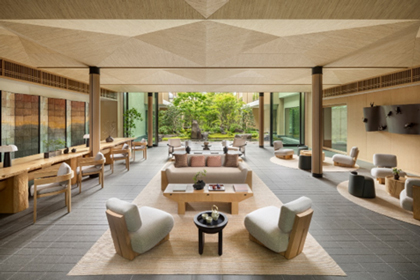
Mr. Miyazaki: What kind of guests does Six Senses Kyoto aim to attract?
Mr. Yamazaki: As a hotel built around sustainability and wellness, majority of our guests are international travelers who already prioritize sustainability in their lives. We want them to enjoy a range of wellness experiences during their stay. At the same time, we also welcome local residents interested in sustainability to use our facilities. While most of our overnight guests are from overseas, many locals enjoy our restaurants and spa.
Mr. Miyazaki: What motivated you to pursue LEED certification for this project?
Mr. Yamazaki: All Six Senses brand hotels are required to obtain LEED certification, so pursuing LEED certification was a natural decision when we chose the Six Senses brand for this property. We achieved LEED v4 Silver certification for this hotel. Among other Six Senses hotels, those in Saudi Arabia and India have obtained LEED Platinum certification, while the hotel in Rome has earned LEED Gold certification. This hotel in Kyoto is the first Six Senses property in Japan to obtain LEED certification under LEED v4.
Mr. Miyazaki: What was the biggest challenge in obtaining LEED certification?
Mr. Yamazaki: The greatest challenge we faced was balancing shower comfort with water-saving performance. High-efficiency showerheads often tend to compromise the comfort of the shower experience. To meet both the high standards set by Six Senses and the water-saving requirements under LEED, we carefully tested a wide range of products before selecting the most suitable showerhead. Now, more than a year since opening, we have received no complaints about water flow.
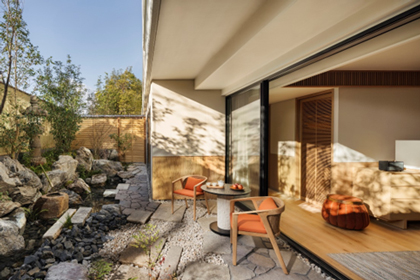
Mr. Miyazaki: What have been the benefits of achieving LEED certification?
Mr. Niimi: Recently, we’ve noticed that during interviews and media coverage, there’s growing interest in whether we have obtained environmental certifications. As more hotels emphasize their environmental and sustainability efforts, it has become harder to stand out. What’s now really valued is not just claiming to be sustainable, but having a credible, third-party certification to back it up. It’s encouraging to see that there’s a shift towards emphasizing empirical evidence in the evaluating environment impact and sustainability, rather than just relying on qualitative claims. I believe that in the future, demand for proven achievements in environmental responsibility and sustainability will only grow, and LEED certification will become an important asset for business.
Mr. Yamazaki: We’ve seen a similar trend, with an increase in LEED certification in the logistics sector as well. Certified warehouses tend to attract tenants faster, and investors clearly prefer to invest in these kinds of properties. I believe that hotels will follow suit, and obtaining certification will similarly become a crucial factor for their success. From an investor’s perspective, LEED certification is increasingly seen as a noteworthy factor.
Mr. Kosaka: That’s a great point, and it’s something we’ve already experienced. The commissioning data collected during certification has proven to be a valuable resource for ongoing operations. We’ve created a task force within the hotel to optimize operations based on that data.
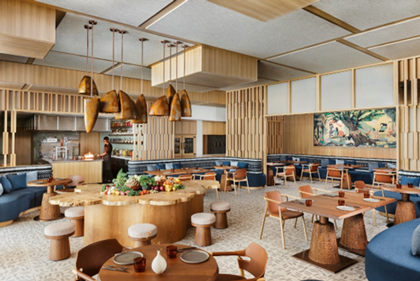
Mr. Miyazaki: I saw the LEED plaque displayed in the Earth Lab. Are you actively using LEED certification as a part of your promotion?
Mr. Yamazaki: Six Senses has positioned itself as an environmentally conscious brand long before sustainability became a widespread term. We see ourselves as pioneers, not only in gaining LEED certification but also in adopting broader environmental practices. While we do not heavily emphasize our LEED certification in promotion materials, we remain committed to sustainability in all aspects, starting with environmental responsibility. Our focus is on continuous improvement through various initiatives, not just certification.
Mr. Miyazaki: Are there any initiatives unique to Six Senses Kyoto?
Mr. Kosaka: At the request of Six Senses, we brought in a Feng Shui consultant to evaluate the building design and furniture layout from a Feng Shui perspective. Feng Shui is a practice that has identified patterns over long periods of time, based on nature forces and energy flow. What makes Six Senses Kyoto unique is how we’ve combined this traditional practice with modern, quantitative evaluation methods. Kyoto itself is said to have been designed according to Feng Shui principles, with Mount Kurama playing a key role. Inspired by this, the hotel’s lobby features artwork reflecting the essence of Mount Kurama.
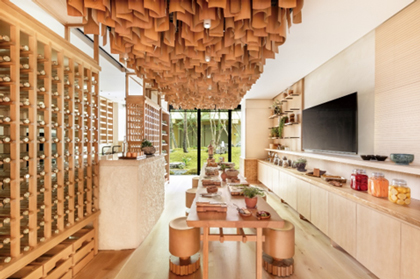
Mr. Miyazaki: Since LEED is a requirement for all Six Senses properties, are there any plans to build new Six Senses hotels in the future?
Mr. Kosaka: Yes, we have two more Six Senses hotels planned in Japan, both aiming for LEED certification. Hotels typically consume large amounts of energy, so achieving certification can be challenging. However, we will apply the experience we’ve learned from Kyoto. By certifying multiple hotels under the same LEED version, we’ll be able to track the evolution of Six Senses’ sustainability practices in a more measurable and objective way.
Mr. Miyazaki: Learning about the various initiatives in sustainability and wellness at Six Senses Kyoto has been truly impressive. I am deeply inspired by the Six Senses’ long-standing pioneering efforts in these areas. It also provided a clear understanding of why obtaining LEED certification across all Six Senses hotels is not just a goal, but a natural and essential part of the brand’s commitment to sustainability. I sincerely thank everyone for participating in this interview.
Click here for Japanese version
日本語版はこちら


